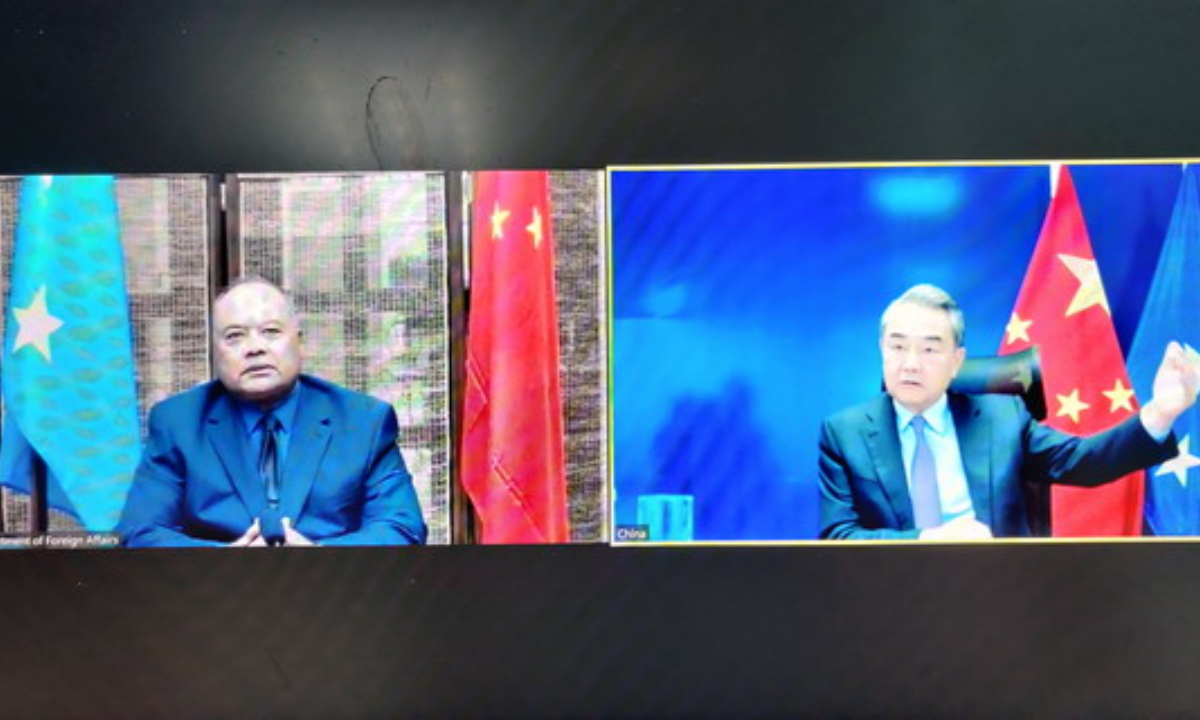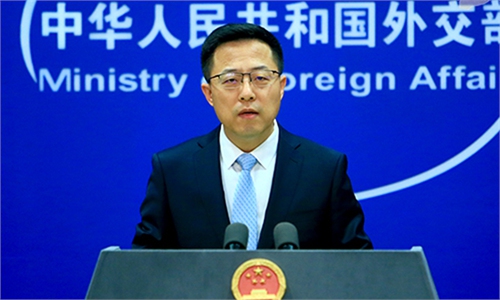What we do in Pacific Islands is building road and bridge, not increasing military presence: Chinese Foreign Minister

Photo: Courtesy of Ministry of Foreign Affairs
Nearly half a century of exchanges between China and the Pacific Island countries have proven that the exchanges have not and will not affect regional security and stability in the future, we focus on economic development and care about the improvement of people's standard of living, Chinese State Councilor and Foreign Minister Wang Yi told his counterpart from Federated States of Micronesia (FSM) via video link on Thursday.
"What we do in the island country is to build roads and bridges, not to increase military presence," Wang told Secretary of Foreign Affairs, Kandhi Elieisar.
Wang met Elieisar virtually on Thursday as Chinese foreign minister arrived in Papua New Guinea (PNG) on Thursday, the last leg of his trip to the South Pacific, after achieving positive results with other island countries.
Over the 30 years since the establishment of China-Micronesia diplomatic ties, the two countries have overcome obstacles and advanced a shared friendship, bilateral trade grew over 30 percent in 2021, which fully demonstrated the potentiality, Wang said.
At the second China-Pacific Island Countries Foreign Ministers' Meeting on Monday, Wang announced that China will continue to jointly build six new cooperation platforms with regional countries in areas including poverty alleviation, disaster prevention, climate change and agriculture.
In reporting that China and Pacific Island countries were unable to sign a sweeping agreement, several Western media outlets cited the previous opposition from President of the FSM David Panuelo, who said the draft of the agreement should be rejected as it essentially binds all Pacific Island countries to China and would affect the sovereignty of Pacific Island countries.
Experts said in the face of pressure and personal interests, a few people are willing to be led by the US, which would undermine the interests of the country and the people. And FSM is one of three free associates of the US in the region and home to the world's largest and most advanced strategic missile testing site, it is obvious to all which country is threatening FSM's survival and development.
Chen Hong, president of the Chinese Association of Australian Studies and director of the Australian Studies Centre at East China Normal University, told the Global Times on Thursday though there is a history of close ties with the US, FSM also strives for receiving more concrete support from the US, rather than only lip service. But the fact is that some people in FSM are reduced to political megaphones and instruments of the US, and that's regrettable.
Actually, during Wang's visit to the Pacific Island countries, Western countries, especially the US, have spared no efforts in mobilizing all kinds of megaphones such as political opponents and media to voice its slander against China, taking advantage of its historic close relations with the countries, Chen said.
But Wang's visit has not been affected by these negative sentiments - Wang has been warmly welcomed to countries visited, received positive feedback for a visit that is about to wrap up after consolidating fruitful and promising results.
In another virtual meeting between Wang and John Haglelgam, Former President of the FSM and President of the Micronesia-China Friendship Association (MCFA), Haglelgam noted that he was proud to make the strategic decision to establish diplomatic ties with China 32 years ago.
Micronesia is sincerely grateful for China's strong support in Micronesia's struggle for sovereignty and independence, Haglelgam said, noting that China's assistance comes with no political strings attached which greatly helps the country improve living standards, governance, and promote sustainable development.
Wang's virtual visit to FSM shows the strength and maturity of the China-FSM relationship, Elieisar said. Since the establishment of the bilateral relationship, China has always been sincere to FSM and engaged in fruitful and practical cooperation, which has greatly contributed to the FSM's social development and anti-epidemic work.





